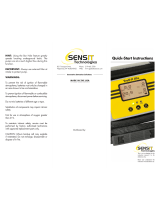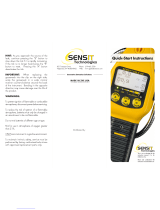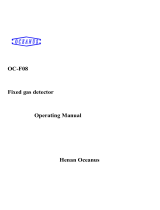Page is loading ...

MultiRAE PLUS
MULTI-GAS MONITOR
PGM-50
OPERATION AND MAINTENANCE
MANUAL
(Document No.: 008-4001)
Rev. G
RAE SYSTEMS INC.
1339 Moffett Park Drive
Sunnyvale, CA 94089
October 2001

RAE Systems Product Line
§ Gas Detection Tubes & Pumps
§ SampleRAE Electronic Sampling Pump
§ MultiRAE PLUS Multi-gas Monitors
§ MultiRAE IR Multi-gas Monitors w/CO
2
§ MultiRAE Confined Space Monitor
§ QRAE PLUS Multi-gas Monitors
§ QRAE Confined Space Monitor
§ VRAE Five-Gas Monitors
§ DRAE Two-Gas Monitors
§ MiniRAE 2000 Portable VOC Monitor (PID)
§ ppbRAE Portable ppb-Level VOC Monitor (PID)
§ UltraRAE Specific Compound Monitor
§ CDRAE Corona Discharge VOC Monitor
§ ToxiRAE PLUS PID Monitor
§ ToxiRAE PLUS Single Gas Monitors
§ ToxiRAE PLUS Oxygen Monitor
§ ToxiRAE PLUS Combustible Gas Monitor
§ MiniRAE PLUS Classic PID
§ ModuRAE Fixed System PID
§ AreaRAE Wireless Multi-point, Multi-gas Detection
Systems
How can I be informed and updated?
Be sure to mail in your warranty card via email, post or fax to get on
RAE’s private database (information is never supplied to others).

You will be updated on new products, technical advisory notices, new
accessories and much more. Thank you for your purchase!

i
Table of Contents
1. GENERAL INFORMATION.......................................1-1
1.1 General Specifications...........................................1-2
2. OPERATION OF MULTIRAE PLUS.........................2-1
2.1 Physical Description..............................................2-2
2.2 Keys and Display....................................................2-4
2.3 Power On/Off.........................................................2-7
2.4 Operations.............................................................2-10
2.5 Alarm Signals........................................................2-17
2.6 Back Light.............................................................2-20
2.7 Preset Alarm Limits and Calibration..................2-21
2.8 Integrated Sampling Pump...................................2-22
2.9 Datalogging...........................................................2-24
3. OPERATION OF ACCESSORIES..............................3-1
3.1 Battery Charging Operation...................................3-2
3.2 Alkaline Battery Adapter........................................3-4
3.3 Water Trap Filter....................................................3-5
3.4 Remote Sampling Probe or Tygon Tubing...........3-6
3.5 Dilution Fitting.......................................................3-7
3.6 Calibration Adapter................................................3-8
4. PROGRAMMING OF MULTIRAE PLUS...............4-1
4.1 Programming Mode ...............................................4-2
4.2 Keys for Programming Mode ...............................4-4
4.3 Entering into Programming Menu........................4-5
4.4 Calibration of MultiRAE PLUS Monitor.............4-7
4.4.1 Fresh Air Calibration.......................................4-10
4.4.2 Multiple Sensor Calibration..............................4-11
4.4.3 Single Sensor Calibration.................................4-14
4.4.4 Modify Span Gas Value...................................4-17
4.4.5 Change LEL/VOC Span Gas...........................4-18
4.5 Change Alarm Limits...........................................4-20

ii
4.6 View or Change Datalog......................................4-22
4.6.1 Reset Peak and Minimum ................................4-23
4.6.2 Clear All Data 4-24
4.6.3 Change Datalog Period....................................4-25
4.6.4 Select Data Type.............................................4-26
4.6.5 View Datalog..................................................4-27
4.6.6 Enable / Disable Datalog..................................4-28
4.7 Change Monitor Setup.........................................4-29
4.7.1 Change Site ID 4-30
4.7.2 Change Alarm Mode.......................................4-31
4.7.3 Change User Mode.........................................4-32
4.7.4 Change Real Time Clock.................................4-33
4.7.5 Change Back Light Mode................................4-34
4.7.6 Change Password............................................4-35
4.7.7 Change Pump Speed.......................................4-36
4.7.8 Change Averaging Method ..............................4-37
4.8 Change Sensor Configuration..............................4-38
4.8.1 Change LEL/VOC Gas Selection.....................4-40
4.8.2 Enable / Disable Sensor...................................4-44
4.8.3 Change Dilution Ratio ......................................4-45
4.8.4 Change PID Lamp Type..................................4-46
4.9 Exit Programming Mode .....................................4-47
5. COMPUTER INTERFACE
FOR MULTIRAE PLUS...........................................5-1
5.1 Install ProRAE-Suite Software.............................5-2
5.2 Connect MultiRAE PLUS to PC...........................5-4
5.3 Start ProRAE-Suite Software................................5-4
5.4 Setup Communication Port...................................5-7
5.5 Processing the Configuration Data.......................5-8
5.5.1 Editing the Configuration Data............................5-9
5.5.2 Send Configuration to MultiRAE Plus...............5-21
5.5.3 Saving Configuration Data................................5-22
5.5.4 Configuring All Settings....................................5-23

iii
5.6 Processing the Logged Data................................5-24
5.6.1 Receive Data from MultiRAE PLUS ................5-25
5.6.2 View Logged Data in Text Mode.....................5-26
5.6.3 View STEL/TWA/AVG Value ........................5-28
5.6.4 View Summary Information..............................5-29
5.6.5 View Logged Data in Graph Mode..................5-30
5.6.6 Export the Displayed Data to a Text File..........5-34
5.6.7 Export Graphic to a File...................................5-35
5.6.8 Print the Logged Data......................................5-36
5.7 Upgrade the Datalog Option................................5-37
5.8 Upgrade the Firmware..........................................5-39
6. THEORY OF OPERATION.........................................6-1
7. MAINTENANCE............................................................7-1
7.1 Battery Replacement..............................................7-2
7.2 Sensor Replacement...............................................7-4
7.3 PID Sensor Cleaning / Replacement.....................7-7
7.4 PID Lamp Care.......................................................7-9
7.5 Sampling Pump Replacement..............................7-11
8. TROUBLESHOOTING.................................................8-1
8.1 Special Diagnostic Mode.......................................8-2
8.2 Troubleshooting Table.........................................8-10
APPENDIX A. QUICK REFERENCE GUIDE.............A-1
APPENDIX B. CORRECTION FACTORS...................B-1
APPENDIX C. MULTIRAE PLUS DATA
CONVERSION TO MICROSOFT EXCEL
.............C-1
APPENDIX D. RAE SYSTEMS TECHNICAL
NOTES..............................................................................D-3
APPENDIX E. RAE SYSTEMS APPLICATION
NOTES..............................................................................E-1
APPENDIX F. LITERATURE REQUEST.....................F-1
APPENDIX G. REQUEST FOR RETURN
AUTHORIZATION FORM..........................................G-1
Main Contact Numbers..........................Outer Back Cover

iv
! WARNING !
- DO NOT proceed before reading -
This manual must be carefully read by all
individuals who have or will have the responsibility
for using, maintaining, or servicing this product.
The product will perform as designed only if it is used,
maintained, and serviced in accordance with the
manufacturer's instructions.
CAUTION!!
To reduce the risk of electric shock, turn off power
before removing the monitor cover. Disconnect
the battery before removing sensor module for
service. Never operate the monitor while the cover
is removed. Remove monitor cover and sensor
module only in an area known to be non-
hazardous.
The model PGM-50 equipment is classified as to
intrinsic safety for use in class I, division 1, groups
A, B, C, D, or non-hazardous locations only.

v
Special Note
-1-
When the PGM-50 Multi-gas Monitor is taken out from
the transport case and turned on for the first time, there
may be some residual organic or inorganic vapor
trapped inside the detector chamber. The initial PID or
toxic sensor reading may indicate a few ppm. Ensure an
area free of organic or toxic vapor and turn on the
monitor. After running for several minutes, the residual
vapor in the detector chamber will be cleared and the
reading should return to zero.
-2-
The battery of the MultiRAE PLUS monitor will
discharge slowly even if it is turned off. If the monitor
has not been charged for 5-7 days, the battery voltage
will be low. Therefore, it is a good practice to always
charge the monitor before using it. It is also
recommended to fully charge the monitor for AT LEAST
10 HOURS before initial use (see Section 7 for more
information on battery charging and replacement).

vi
WARNINGS:
Use only RAE Systems battery packs, part Nos. 500-
0028, 500-0029, or 500-0039. This instrument has
not been tested in an explosive gas/air atmosphere
having an oxygen concentration greater than 21%.
Substitution of components may impair intrinsic
safety. Recharge batteries only in non-hazardous
locations.
AVERTISSEMENT:
Utiliser seulement l'ensemble de batterie RAE
Systems, la reference 500-0028, 500-0029 au 500-
0039. Cet instrument n’a pas été essayé dans une
atmosphère de gaz/air explosive ayant une
concentration d’oxygène plus élevée que 21%. La
substitution de composants puet compromettre la
sécurité intrinsique. Ne charger les batteries que
dans emplacements désignés non dangereuse.
STATIC HAZARD:
Clean only with a damp cloth.
DANGER RISQUE D'ORIGINE ELECTROSTATIQUE:
Nettoyer uniquement avec un chiffon humide.

vii
CAUTION:
For safety reasons this equipment must be operated
and serviced by qualified personnel only. Read and
understand instruction manual completely before
operating or servicing.
ATTENTION:
Pour des raisons de sécurité, cet équipment doit
être utilisé, entretenu et réparé uniquement par un
personnel qualifié. Étudier le manuel d’instructions
en entier avant d’utiliser, d’entretenir ou de réparer
l’équipement.

viii
CAUTION:
Before each day’s usage, sensitivity must be tested
on a known concentration of methane gas equivalent
to 20-50% of full scale concentration. Accuracy
must be within 0 to +20% of actual. Accuracy may
be corrected by calibration.
ATTENTION:
Avant chaque utilisation journalière verifier la
sensibilité avec une concentration connue de
methane equivalente a 20 - 50% de la pleine échelle.
La précision doit être comprise entre 0 - 20% de la
valeur vraie et peut être corrigée par une procédure
diétalonnage.
CAUTION:
Any rapid up-scale reading followed by a declining or
erratic reading may indicate a gas concentration
beyond upper scale limit which may be hazardous.
ATTENTION:
Toute lecture rapide et positive, suivie d’une baisse
subite au erratique de la valeur, peut indiquer une
concentration de gaz hors gamme de détection qui
peut être dangereux.
WARNING:

ix
The calibration of all newly purchased RAE Systems
instruments should be tested by exposing the
sensor(s) to known concentration calibration gas
before the instrument is used or put into service.
For maximum safety, the accuracy of the MultiRAE
PLUS should be checked by exposing the sensor(s)
to known concentration calibration gas before each
day’s use.
AVERTISSEMENT:
La calibration de toute instruments de RAE Systems
doivent être testé en exposant l’instrument a une
concentration de gaz connue par une procédure
diétalonnage avant de mettre en service l’instrument
pour la première fois.
Pour une securite maximale, la sensibilité du
MultiRAE PLUS doit être verifier en exposant
l’instrument a une concentration de gaz connue par
une procédure diétalonnage avant chaque utilisation
journalière.

GENERAL INFORMATION
1 - 1
1. GENERAL INFORMATION
MultiRAE PLUS is a programmable Multi-gas monitor
designed to provide continuous exposure monitoring of
toxic gases, oxygen and combustible gases for workers in
hazardous environments. It monitors three classes of
hazardous gases:
(1) Organic vapors in the ppm range with the supplied
Photo-Ionization Detector (PID) using a 9.8, 10.6 eV
or 11.7 eV gas discharge lamp,
(2) Combustible gases near their lower explosive limits
(LEL) with a catalytic bead sensor, and
(3) Inorganic compounds, including oxygen deficiency,
with the electrochemical sensors.
Other features include:
• Lightweight and Compact
- 16 oz (454 g), Walkman
size.
• Dependable and Accurate
- 10 hours monitoring with micro controller.
• User Friendly
- menu driven, intuitive end-use operation.
• Programmable Alarm Thresholds
- audio buzzer & flashing display alarm.
MultiRAE PLUS (PGM-50) consists of: A Multi-gas
Monitor, a battery charger, rubber boot, alkaline battery
adapter, water and dust filters, plus calibration accessories.

GENERAL INFORMATION
1 - 2
1.1 General Specifications
Table 1.1
Multi-Gas Monitor Specification
Dimensions: 4.65”L x 3.0”W x 1.9”H
(11.8 cm x 7.6 cm x 4.8 cm)
Weight: 16 oz (454 g) with battery.
Detector: Up to five sensors (oxygen, combustible,
two toxic and VOC). Electrochemical
sensors for toxic gases and oxygen, photo-
ionization detector for ppm level VOCs,
and catalytic sensor for LEL level
combustible gases.
Battery: Rechargeable, 4.8V/1100 mAh Li ion or
4.8V/1700 mAh Ni-Cd battery pack with
built-in charger (10 hours charge time) or
a 4 AA alkaline battery adapter.
Operating Time: Up to 10 hours continuous operation.
Display: 2 line, 16 digit LCD with LED back light
automatically in dim light.
Key-pads: 1 operation key and 2 programming keys.
Direct Readout: Instantaneous values (up to 5), sensor
name, high and low values for all detectors,
TWA and STEL values for toxic and VOCs,
battery voltage and elapsed time.
(Continued)

GENERAL INFORMATION
1 - 3
Multi-Gas Monitor Specification
(Continued)
Alarm Settings: Separate alarm limit settings for TWA,
STEL, Low and High alarm.
Range, Resolution and Response Time (t
90
diffusion):
CO 0-500 ppm 1 ppm 20 sec
H
2
S 0-100 ppm 1 ppm 30 sec
SO
2
0-20 ppm 0.1 ppm 15 sec
NO 0-250 ppm 1 ppm 20 sec
NO
2
0-20 ppm 0.1 ppm 25 sec
Cl
2
0-10 ppm 0.1 ppm 60 sec
O
2
0-30 % 0.1 % 15 sec
VOC 0-200 ppm 0.1 ppm 10 sec
VOC 200-2000 ppm 1 ppm 10 sec
LEL 0-100 % 1 % 15 sec
HCN 0-100 ppm 1 ppm 60 sec
NH
3
0-50 ppm 1 ppm 150 sec
PH
3
0-5 ppm 0.1 ppm 60 sec
Alarm: 90 dB buzzer and flashing red LED to
indicate exceeded preset limits, low
battery, or sensor failure.
Calibration: Two point field calibration for fresh air
and standard reference gases.
Attachment: Rubber boot, wrist strap, belt clip.
Sampling Pump: Internal integrated with 300 cc/min flow
rate (high setting).
Protection: Password protected calibration settings,
alarm limits, and data.

GENERAL INFORMATION
1 - 4
Multi-Gas Monitor Specification
(continued)
Intrinsic Safety: UL & cUL Class 1, Division I, Group
A,B,C,D (US & Canada), EEx ia IIC T4
(Europe).
EM Immunity: No effect when exposed to 0.43 mW /cm
2
RF interference (5 watt transmitter at 12
inches).
Data Storage: 20,000 readings (64 hours, 5 channels at 1
minute interval) in non-volatile memory.
Datalog Interval: Programmable 1- 3600 sec.
External Alarm: Optional plug in pen size vibration alarm or
earphone.
Communication: Upload data to PC and Download monitor
setup from PC through RS-232 link to
serial port on PC.
Temperature: -20
o
to 45
o
C (-4
o
to 113
o
F).
Humidity: 0 % to 95% relative humidity.
(non-condensing)
Configuration: 2, 3, 4 and 5 gas with / without pump
and with / without datalogging.

OPERATION OF MULTIRAE PLUS
2 - 1
2. OPERATION OF MULTIRAE PLUS
The MultiRAE PLUS Monitor gives real time measurements
and activates alarm signals whenever the exposure exceeds
preset limits on any of the five possible sensors. Prior to
factory shipment, the MultiRAE PLUS is pre-set with
default alarm limits and the sensors are pre-calibrated with
standard calibration gas. However, the user should calibrate
the instrument before the first use. After the monitor is
fully charged and calibrated, it is ready for immediate
operation.

OPERATION OF MULTIRAE PLUS
2 - 2
2.1 Physical Description
Figure 2-1 shows the main components of the MultiRAE
PLUS Multi-gas Monitor which include:
Figure 2-1 Major parts of the MultiRAE PLUS
Multi-gas Monitor
• 3 keys for the user to interact with the monitor: 1
operation key and 2 programming keys for normal
operation or programming of the monitor.
• LCD display with back light to show real time and
calculated measurements.
Gas Inlet and Filter
Buzzer &
Gas Outlet
Charge Contact
Serial Port for PC
Communication
Wrist Strap
Programming Keys
LCD Display
LED Alarm

OPERATION OF MULTIRAE PLUS
2 - 3
• Buzzer and red LED for alarm signal whenever the
exposures exceed preset limits and for error
conditions.
• Wrist strap.
• Charge contact for plugging directly to the charging
station.
• Gas entry port.
• Serial communication port for PC interface.

OPERATION OF MULTIRAE PLUS
2 - 4
2.2 Keys and Display
Figure 2-2 shows the LCD display and the keypad on the
front panel of the monitor. The functions of the 3 keys
during normal operation are summarized in Table 2.1 on the
next page:
Figure 2-2 Key-pad and Display of the MultiRAE PLUS
Multi-gas Monitor
Light
sensor
0.1
0.0
0.0
0.0
20.9
MODE
ON
Y/+
N/-
OXY
TOX2
VOC
LEL
TOX1
LED alarm/
charge status
[Mode]
key
[Y/+] Key
[N/-] Key
/




